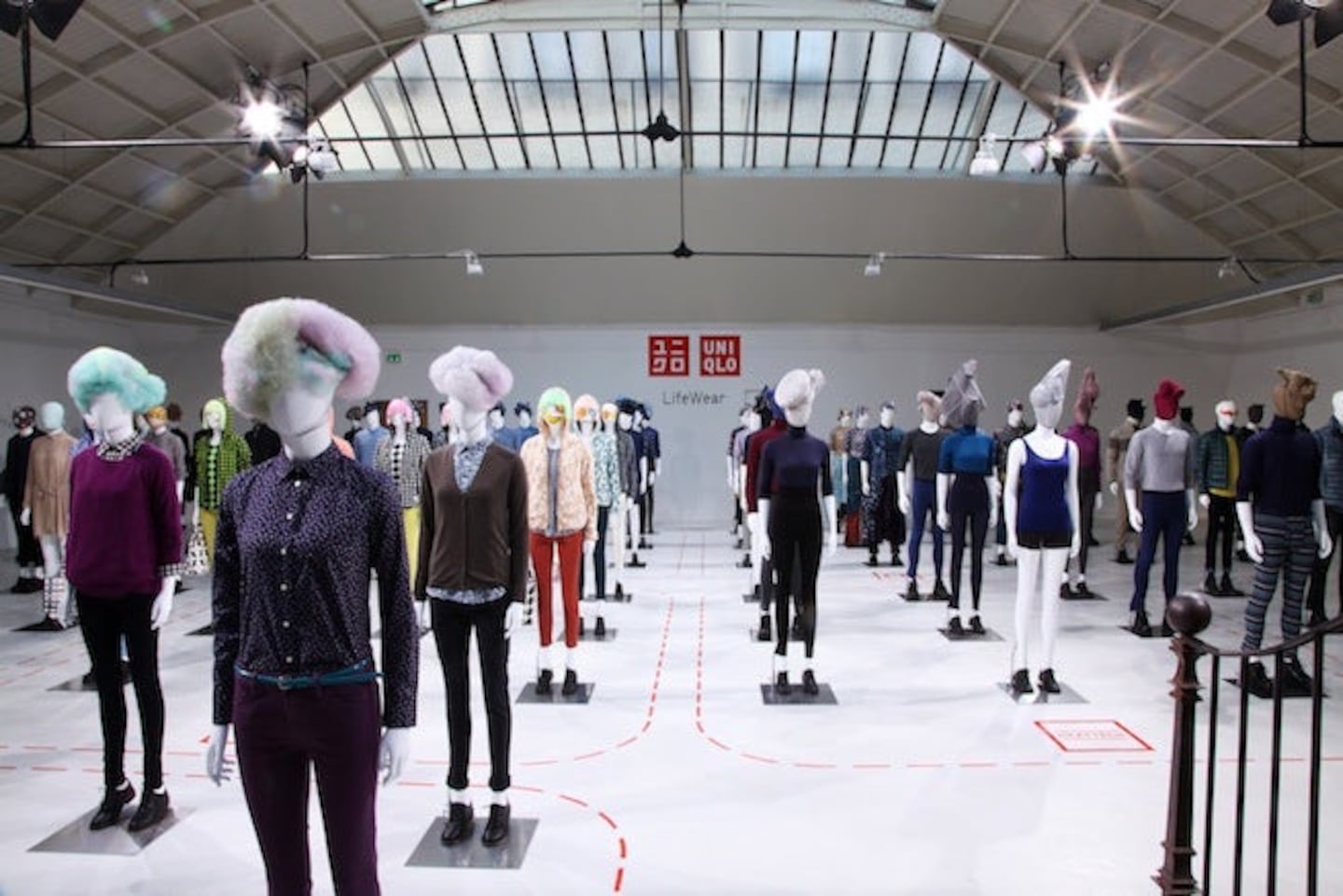
The Business of Fashion
Agenda-setting intelligence, analysis and advice for the global fashion community.

Agenda-setting intelligence, analysis and advice for the global fashion community.

PARIS, France — Natural light flooded the serene space on rue Commines where neatly arranged mannequins displayed pieces from Uniqlo's colourful Fall/Winter 2013 collection. Composed of eleven distinct, but mix-and-matchable "projects" — including Ultra Light Down, Ultra Stretch Jeans and Topics, a collaboration with Swedish textiles collective 10-Gruppen — the collection was beautifully styled by the brand's fashion director, Nicola Formichetti, with stunning headpieces by Katsuya Kamo.
But underneath the visual flair of the presentation — what Uniqlo executives often call “the spice” or “the topping” — is a concept, and a company, more geared around innovation than fashion.
Lifewear is meant to be continued every season. Like iPhone 4, iPhone 5.
The collection was the first to be presented under the brand’s newly unveiled tagline, Lifewear. "Lifewear is the theme of our collection. But it's meant to be continued every season. Like iPhone 4, iPhone 5. It's the idea of continuation, but with updates: new elements, new fabrics,” explained Naoki Takizawa, Uniqlo’s design director.
The Apple analogy is revealing. Tadashi Yanai, founder and chief executive of Fast Retailing, which owns Uniqlo, is fond of saying that "Uniqlo is not a fashion company, it's a technology company." And indeed, the brand's approach to making apparel has more in common with the iterative approach to product development embraced by the technology industry than the cyclical, trend-driven rhythm of the fashion industry.
ADVERTISEMENT
In fact, despite the name of its parent company, it's a misnomer to call Uniqlo a 'fast fashion' company. While Zara has built the world's largest apparel business based on rapidly responding to fast-changing fashion trends, getting items from factory to store in approximately two weeks, Uniqlo takes the exact opposite approach, planning production of its wardrobe essentials up to a year in advance.
“We don't have seasonal fashion themes like other companies. We are much more product focused. Year by year, we are constantly testing, improving and updating,” said Yuki Katsuta, Uniqlo’s senior vice president of global research and design.
"We don't start designing with a vague trend in terms of colour or fashion; we start with the requirements of real people and their real lives. We have a set of projects such as Heattech, Ultra Light Down or Cashmere, and we stretch the boundaries to constantly add innovation and excitement from season to season,” added Dr. Berndt Hauptkorn, chief executive of Uniqlo Europe. “Technology is key for our brand which is all about quality, innovation and the improvement of life. Fashion alone does not deliver on these goals.”
Katsuta gave the example of Ultra Stretch Jeans, which employ an innovative, super-stretch fabric, developed in partnership with chemicals company Toray Industries, that moulds to the body, eliminating bagginess. "A product should have a fundamental value. Fashion is just the story around that fundamental value," he said.
“I’ll tell you a story,” added Takizawa. “When I had my first interview with Mr Yanai, he said to me: 'What is the most important innovation in the history of fashion? It's pantyhose.’ When pantyhose was created, lifestyles changed. Fashion is always changing, but an innovation like pantyhose creates major change. It means everyone can show legs and wear a skirt in the wintertime, even if it's zero degrees,” he said. “Maybe Uniqlo products should have the same value as pantyhose, but for the future."
With Lifewear, Uniqlo is aiming to create an entirely new category of clothing, not unlike the way Apple's iPad created a new category of computing. "You had haute couture and prêt-à-porter. And now casualwear and sportswear. For Mr Yanai, Lifewear is a new category," said Takizawa.
Specifically, Lifewear is targeting the emerging opportunity between casualwear and sportswear, which helps to explain why Uniqlo has recently teamed up with tennis and golf champions Novak Djokovic and Adam Scott, who are both “global brand ambassadors” for the company.
"Between fashion and sports is a new area," said Kensuke Suwa, Uniqlo's director of global marketing. "There are a lot of fashion trends going on, but there is no true innovation that impacts your actual life. How to make your life better could be in the middle between fashion and sports. For example, athletes wear technically sophisticated uniforms; some of the essence of that could result in better clothes that would change clothing itself, instead of just following fashion trends."
ADVERTISEMENT
Seen this way, Uniqlo’s true competition may not be fast fashion companies like Zara and H&M, but sporting giants like Nike, which appears to be coming at the same opportunity space, between sportswear and casualwear, from the other direction.
Disclosure: Vikram Kansara travelled to Paris as a guest of Uniqlo.
Join us for a BoF Professional Masterclass that explores the topic in our latest Case Study, “How to Turn Data Into Meaningful Customer Connections.”
Social networks are being blamed for the worrying decline in young people’s mental health. Brands may not think about the matter much, but they’re part of the content stream that keeps them hooked.
After the bag initially proved popular with Gen-Z consumers, the brand used a mix of hard numbers and qualitative data – including “shopalongs” with young customers – to make the most of its accessory’s viral moment.
At The Business of Fashion’s Professional Summit in New York last week, Sona Abaryan, partner and global retail and luxury sector lead at tech-enabled data science firm Ekimetrics, shared how businesses can more effectively leverage AI-driven insights on consumer behaviour to achieve a customer-centric strategic approach.